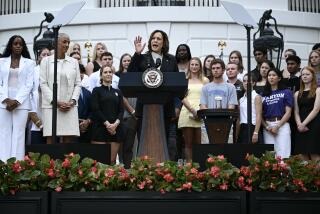Voting isn’t democracy
- Share via
THE UNITED STATES is not drawing the right lessons from Hamas’ victory in the Palestinian elections. President Bush and Secretary of State Condoleezza Rice admitted that they underestimated Hamas’ strength and made it clear that they had hoped for a different outcome. But that’s not the critical issue.
The bigger point is that Hamas’ victory reveals a major strategic deficiency in the American design for democracy in the Middle East. The Bush administration has repeatedly sought to equate elections around the world with democracy, and it has been particularly obsessed with elections in Iraq, Egypt and the Palestinian territories.
But in the Middle East there is a paradox: Islamic radical movements exploit democratic elections to gain power and to replace secular regimes with Islamic theocracies. This strategy effectively thwarts any hope of a true democracy in the region. Among the most glaring examples of this are Iran and its 1979 referendum creating the Islamic republic; Algeria in 1991, when the military halted the second round of voting after the Islamic Salvation Front’s surprising first-round success; and now the Palestinian Authority.
Current U.S. policy will not lead to democracy because democracy is much more than elections. Elections encourage public participation in choosing leaders, but democracy is based on values, institutions and constitutions -- constitutions that by their very democratic nature cannot empower Islamic terrorist organizations such as Hamas.
All political movements must embrace the basic principles of democracy and meet minimum conditions before they can participate in elections. And racist movements are forbidden by law to participate in elections in Europe.
Hamas should have been banned from participating in the Palestinian elections for five reasons: It wants to establish an Islamic theocracy in the Palestinian territories; it maintains an independent, armed militia; this militia has often challenged the Palestinian government and has conducted an unauthorized, extensive terrorist campaign against Israel; Hamas rejects the Oslo agreements, which provided the basis for the establishment of the Palestinian Authority; and finally, Hamas wants to destroy Israel and opposes peace and negotiations.
But Hamas was not banned. Israel asked the U.S. to persuade Palestinian Authority President Mahmoud Abbas to insist on these minimal preconditions (which Hamas would most likely have rejected), and it warned about the consequences of allowing unconditional Hamas participation. Unfortunately, Bush ignored Israel in this case and instead accepted dubious assurances from Abbas.
Commentators have suggested that radical Islamic movements become more moderate and pragmatic when they assume power. Recent history, however, doesn’t support this claim. After 25 years, the Islamic theocracy in Iran is still extremist; the Taliban established a repressive regime in Afghanistan; and Hezbollah remains a terrorist organization, although it has representatives in the Lebanese government. In the months ahead, Hamas is more likely to create a strategic relationship with Islamic radical forces such as Iran and Hezbollah than to forge serious ties with the West.
Opponents of democracy in the Middle East will exploit Hamas’ victory to block badly needed political reforms in the region. This wouldn’t be the right lesson in democratic reform. Rather than pushing for elections first, the U.S. and Europe should encourage societies to establish solid institutions and a constitution that all movements will have to accept before they are allowed to participate in elections.
Democratizing the Middle East will take many years, and instant elections, however successful and legitimate, will prove insufficient in the quest for true democracy.
More to Read
Get the L.A. Times Politics newsletter
Deeply reported insights into legislation, politics and policy from Sacramento, Washington and beyond. In your inbox twice per week.
You may occasionally receive promotional content from the Los Angeles Times.










